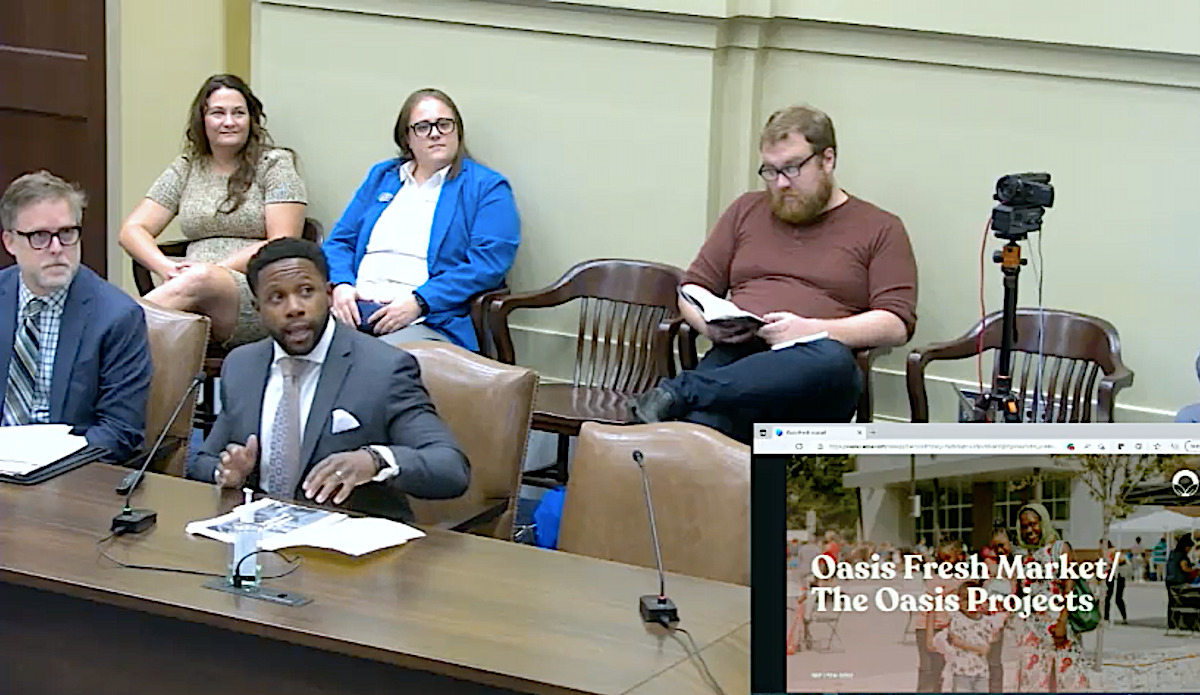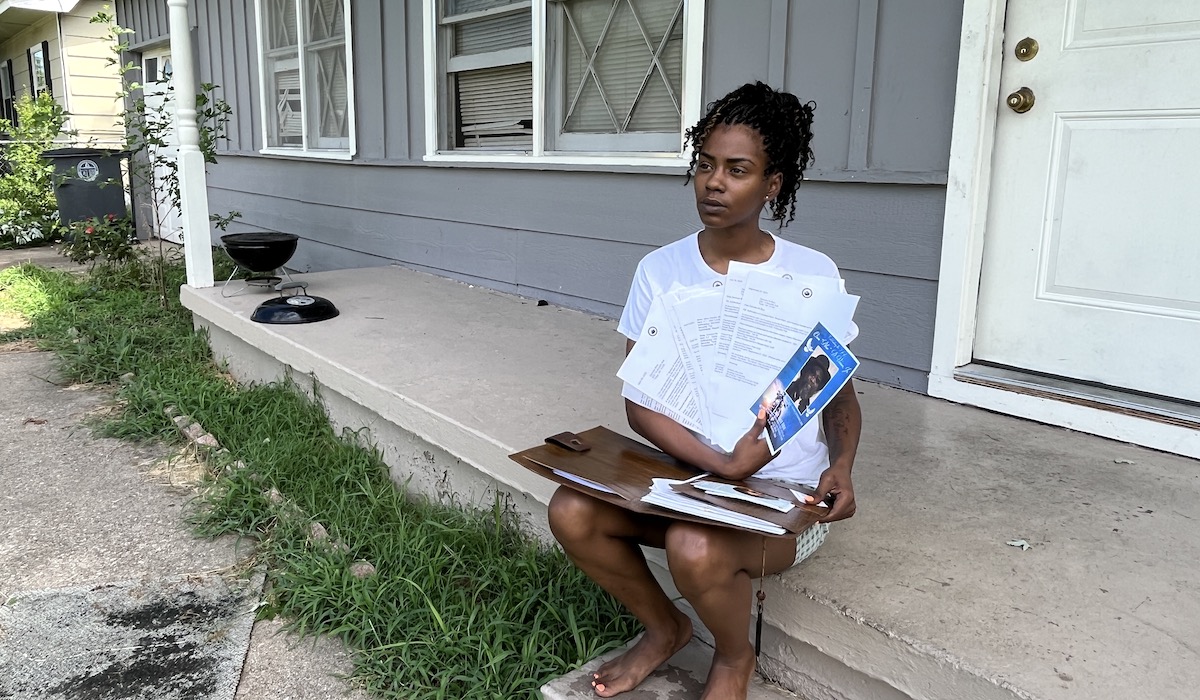

Citing “material breaches” and questionable expenses, Tulsa County officials are asking Oasis Fresh Foundation to return more than 30 percent of the $500,000 in American Rescue Plan Act funding provided to the nonprofit organization to improve “food distribution resources, transportation and workforce training” in high-poverty areas.
“From the records provided by Oasis, very little of the funds appear to have been spent in a manner remotely related to the funding mission,” Assistant District Attorney Andrew Mihelich wrote in a letter to Oasis director Aaron “AJ” Johnson on Dec. 4.
The same day, the Tulsa County Board of Commissioners approved a “formal demand” for $156,911.85 as “remedy of these breaches.”
Mihelich concluded his four-page letter with a request for Johnson to direct all future correspondence to the District Attorney’s Office, noting that four “conditions for suspension and termination have been met.”
In 2021, the Tulsa County Board of Commissioners approved a $1 million award of ARPA funds to Oasis Fresh Foundation, a nonprofit Johnson established and rebranded as Oasis Projects to support his for-profit Oasis Fresh Market at 1725 N. Peoria Ave. However, only the first $500,000 was provided to Oasis, and county officials have spent months requesting reports and documentation about how the public dollars have been used.
“Oasis was first awarded the contract with Tulsa County on November 2021 and began work immediately due to the need,” Johnson wrote in an email to NonDoc on Dec. 11. “Fourteen months later, Oasis received additional guidelines with Tulsa County in January 2023 and was asked to sign it. As we work through what was disallowed under the contract we hope to be able to provide further documentation that will substantiate the costs. Costs that cannot be substantiated and remain disallowed will be paid back in full.”
Mihelich’s letter marks the third time this year Johnson has faced questions about his use of funds while running Tulsa nonprofits, and the demand for about $157,000 is the latest in a string of notable financial situations involving the charismatic pastor, who left Victory Christian Church’s employment in April 2021 and assumed control of efforts to open a new grocery store in north Tulsa.
During this year’s regular session, members of the Oklahoma Legislature nearly provided Johnson’s nonprofit $30 million to build additional grocery stores, but lawmakers stopped short after tax documents revealed Johnson paid nonprofit money to his other for-profit company, DreamCo Solutions. Meanwhile, people listed as members of the Oasis Fresh Foundation board of directors stepped forward to say they had never attended a board meeting and that they were unaware of being listed on the organization’s Form 990.
Concern that lawmakers might provide $30 million to the Oasis Fresh Foundation spurred several people to contact NonDoc about Johnson’s tenure as executive director of the Tulsa Dream Center, a nonprofit founded by Victory Christian to support low-income families primarily in north Tulsa.
Among issues reported by whistleblowers to Victory Christian leaders in 2021 stood a small house on North Boulder Avenue that had been donated to TDC as a “dream home” for a family in need. While he was director of TDC, Johnson deeded the house to his DreamCo Solutions company, which took out a $32,500 mortgage on it within weeks of Johnson taking out a pair of separate mortgages to finance his nearly $600,000 new home in Bixby.
The difference between the other two mortgages and the Bixby home’s sale price was close to the amount of the loan Johnson took out on the Boulder home.
Now, Tulsa County also wants Johnson to pay back ARPA funding for a myriad of questionable payments, including upgrades to a van the store purchased.
“Records indicate payments of $5,830.18, for installation of subwoofers, window tinting, smoked tail lights, and other amenities for a van purchased for the funding mission,” Mihelich wrote. “These modifications are plainly unrelated to the funding mission, and an ineligible use of funds under the agreement.”
Johnson denied using ARPA funds to modify the van in a statement sent to Deon Osborne of The Black Wall Street Times. In his Nov. 22 response letter to Tulsa County, he said the van transports people for food, services and workforce opportunities.
“The van was purchased to help residents get access to the services and organizations that support transforming north Tulsa that operate out of Oasis, all free of charge,” Johnson wrote. “One out of six residents within north Tulsa’s qualifies census tract have transportation, so it was purchased to remove one of the many barriers within north Tulsa.”
Man in Johnson’s letter to county: ‘He did not help me’
Buried within Tulsa County’s correspondence about Oasis’ ARPA grant is an expense category called “Benevolence,” which Johnson told analysts partially included “checks made to families in crisis.”
In letters dated Sept. 29 and Nov. 22 to Program Management Group — which county officials contracted with to examine ARPA grant expenditures — Johnson and OASIS chief operating officer Charlie Love described how more than $6,900 of “Benevolence” funds were used.
“There are no invoices for these expenditures, however, all were for families experiencing a variety of crises from homelessness, to house fires,” Johnson and Love wrote Nov. 22. “For example, one individual’s sister was in a coma, and he had to assume responsibility for her four young children and didn’t have suitable accommodation. He needed help to be able to pay a deposit for a bigger place to live so the children weren’t taken into DHS custody.”
That individual was Kshon Camp, a former store manager at Oasis Fresh Market who publicly criticized Johnson in a September article by Deon Osborne of The Black Wall Street Times. In late March, Camp’s sister had a series of seizures and ended up on life support, which left Camp with the challenge of caring for his nieces and nephews while working morning shifts and night shifts at Oasis.
In a Dec. 11 interview with NonDoc, Camp called Johnson’s claim that he helped him this spring after his sister’s seizures “a bold-faced lie.”
“That’s all he does is lie. Any time you question anything from that man in reference to where money is going for that store, it’s always, ‘Let me get with my accountant, let me have them review, I will follow up with you, oh, I had no knowledge of that.’ That is literally always that man’s excuse for everything,” Camp said. “That man did not do anything to help me housing-wise at all.”
Soon after his sister became incapacitated when she had a pair of eight-minute seizures, Camp said he “started to get a little bit overwhelmed.” He said he approached Johnson about taking “a few days off” to meet with DHS about the children and the Tulsa Housing Authority about the possibility of finding a larger home.
While Johnson had given him a $100 gift card for groceries, Camp said his bigger need was flexibility and understanding.
“I had one day off a week, which was supposed to be on Tuesdays, which was a truck day, and it was a 90 percent chance I would get called into work every Tuesday that I was supposed to be off,” Camp said. “I had missed an order for the truck on a Tuesday, and I got called into work. He addressed me on that and put me on a final warning when all of this was happening, when I had never had any issues or mistakes. I had never been coached — no verbal or written warnings. Just straight to a final (warning). He kept asking me, ‘Your head is just not in it right now,’ and he was like, ‘What do you need?’ So I repeatedly, again, advised him, ‘I just need a few days off work. Like, you have not listened to me. You have not accommodated for me. I need some time so I can get this all situated.’”
Camp said Johnson gave him one day off. After spending that entire day at DHS where he “barely got anything done,” Camp said he decided to “call in” the next day at Oasis. At that point, Camp said Johnson became “really upset” and called him into his office when he returned to work.
RELATED
‘Taken advantage of’: 2 houses, 3 pastors and ‘toxic’ allegations for a nonprofit leader by Tres Savage & Bennett Brinkman
“During that conversation, he had made the comment that he could no longer be empathetic to my situation with my sister, and that he couldn’t accept any mistakes that were being made at work, and I basically needed to get my head in the game,” Camp said, noting that Johnson suggested an unpaid week of family leave.
But Camp, who had worked in human resources during his U.S. Army service and also for DISH Network, said he requested to use paid time off as a full-time employee under the Family and Medical Leave Act. Camp said Johnson told him the leave would be unpaid, at which point Camp interviewed at a national retail outlet and took a new job in May.
“It made me feel horrible,” Camp said.
It was not Camp’s first time feeling that way while working for Johnson at Oasis. In September 2022, Camp started at the store part-time, eventually leaving his full-time, work-from-home position to join Johnson at what he considered an important community business.
Soon thereafter, however, Camp said promises about his hourly pay rate went unfulfilled, and he approached Johnson in December to say the difference between his $17.50-per-hour salary and the $19-per-hour salary he’d been promised left him “struggling” and unable to cover the cost of his vehicle registration.
“I really felt disrespected. I felt lied to. I still tried to stay loyal to the company and just work through it,” Camp said. “But every time I followed up with him, his response was always, ‘Let me get with the accountants. Let me have them review some numbers for me and see what increase I can give you,’ and that never happened.”
Camp said Johnson eventually gave him a $1,200 “Christmas bonus” so he could pay for his car tag.
“From that point, it was just like he felt I owed him something. That is how it came across, or how I perceived he would react and respond to me,” Camp said.
Three months later, when Camp’s sister became hospitalized and he assumed responsibility for her children, Camp said Johnson did little to help him, despite listing Camp’s situation as the only specific example of using ARPA funding for “benevolence” in his letters to Tulsa County.
“I can tell you 100 percent, right-hand to God, that man helped me do absolutely nothing. I am still in the same two-bedroom townhouse that I was in when I started working for that company. And I did mention to him that, yes, DHS is involved, and yes, I do need to try to locate a bigger residence. But there was no support from Oasis Fresh Market, from Oasis Projects or Aaron Johnson in reference to that. The only thing that man did for me was help me get my tag in December 2022 after I came back to him frustrated about the fact that he didn’t have my pay right and that I was still struggling and I needed to get my tag because I had gotten pulled over about it,” Camp said. “Again, he didn’t help me with any housing. He didn’t help me with anything outside of giving me $100 in groceries. That was the only support that he provided outside of helping me get my tag, which was a ‘Christmas bonus.’”
Camp said learning his story was referenced by Johnson as an example of Oasis “benevolence” made him “angry.”
“In no way shape or form did he provide any support at all, and I’d come up there in person to tell you that. I’d say it in front of a judge if I had to,” Camp said. “He did not help me with housing support or any other support outside of the $1,200 I received for my Christmas bonus.”
Asked about Camp’s comments, Johnson said by email Dec. 13 that Camp did receive “benevolence assistance” and that he was paid for all of his time off.
“In this entire journey, of trying to bring fresh and healthy food access to all, and additional resources in food deserts, maybe there are things that we could have been done better,” Johnson said. “I am sorry and sincerely apologize to anyone that may have been hurt, and we are also so grateful for the thousands of people that have been helped. We are committed to being focused on what we are called to do and that’s serving people. We have some of the best experts in the space leading us and know that we are better positioned to help families in need, especially in times, like today, where the needs are so great.”
Follow @NonDocMedia on:
Facebook | X | Text or Email
Consultant Marc Jones sees ‘pain’ in Oasis situation

One of those experts was Marc Jones, a former CEO of Homeland and a grocery consultant who did contract work for Oasis until May.
Mihelich, the assistant district attorney, questioned the use of ARPA funds to pay Jones’ consulting fee in his letter to Oasis and Johnson.
“In total, you have spent approximately $145,000 of ARPA funds on Marc Jones. These expenses are not eligible for ARPA funding. The associated lack of documentation allowing taxpayers to see how their money is spent, and the lack of prior approval, are wholly unacceptable,” Mihelich wrote.
According to his LinkedIn page, Jones focuses on advising clients in the grocery business and “improving food access and equity.” When Johnson was seeking $30 million of ARPA funds from the Oklahoma Legislature to build four new Oasis Fresh Market locations, Jones attended meetings and presentations at the State Capitol.
In an interview with NonDoc on Dec. 11, Jones said he was “surprised” to see his fee included in the list of expenses Tulsa County deemed unallowable by Oasis. He said he did not originally know he was being paid with ARPA money.
“My understanding was Oasis had funding to cover my fees,” Jones said. “My understanding and knowledge was that our agreement with Oasis had been reviewed and approved by their board of directors.”
But after multiple people listed on the nonprofit’s Form 990 as board members said they had never been to a meeting and did not know they were identified as part of Oasis Fresh Foundation’s governance structure, Jones said his contract was ultimately approved once a real board was formed.
Jones said that while the initial scope of his work with Oasis Fresh Foundation was to address food insecurity, he and Johnson began to focus more on securing money from the Legislature to expand the grocery concept. When it became clear Johnson would not be awarded the money in May, Jones stopped working with Oasis.
In his demand letter, Mihelich particularly highlighted a trip to New Orleans that Johnson and Jones took together during which they paid for “several costly meals.” Jones said his personal expenses on the trip — for a conference to learn about New Market Tax Credits — were limited.
“I think I only expensed three meals over the course of four days. There is no alcohol on any of them,” Jones said of the trip. “And I think it averaged — like maybe I think it totaled to $120 — so $30 a day I guess is the lavish expense?” Jone said. “As a professional, I would want any of the folks that I work with — whether I’m an employer or consultant — to feel like travel isn’t an opportunity to upgrade your lifestyle, and I certainly don’t approach it that way.”
Jones also emphasized the need for a grocery store serving north Tulsa.
“To me, that’s the pain of all of this,” Jones said. “Regardless of individual situations or how different things were handled, the need is probably as desperate or more desperate as it ever was in terms of people being unable to afford basic groceries, communities not having access to fresh fruits and fresh vegetables — things that a lot of your readers will take for granted, that I often probably in my past had taken for granted being in the industry. And that problem unfortunately doesn’t get solved either by giving food away or by hoping that it gets better. It gets solved by people actively trying to change things. So yeah, I hope none of this takes away from that effort.”
Camp agreed that his community needs the access to groceries and services that Oasis aims to provide, but he called Johnson “a scam artist.” Camp said he still has questions about how Johnson used “gift cards” at the store, which Mihelich also highlighted as a “material breech” of the ARPA contract in his letter.
“Accounting records indicate you have given away $30,000 in gift cards to Oasis, with no backup documentation submitted,” Michelich wrote. “The county thus cannot determine their eligibility whether these funds were used for an eligible ARPA expense or even if the cards exist.”
Camp said cards existed in the store’s safe and would sometimes be used to cover groceries for customers whose totals at checkout were higher than the money they had. However, he said the origin and use of other cards were less clear.
“We would make 500 $50 gift cards, but none of those gift cards were ever actually paid for. They were just created as ‘a guest purchased it online,’ is how we would put those into the system,” Camp said. “But I don’t know where the money actually came from for those or if they were ever actually taken care of or not. I just know that I did those gift cards as ‘online tenders’ for him.”
Camp said the cards were used for large store events, such as a Thanksgiving celebration. He said he has not been contacted by anyone from Tulsa County District Attorney Steve Kunzweiler’s office about how Johnson handled the $500,000 in ARPA money.
“He won’t have any documentation (for the gift cards),” Camp said. “If he gets any documentation submitted, it’s going to be falsified documents, because I can 110 percent tell you that there was nothing that man did legit with those gift cards other than having me at the register creating those.”
Camp said the questionable financial practices, internal conflict and “hostile work environment” he witnessed at Oasis Fresh Market were disappointing.
“I wouldn’t be surprised if that store actually closed,” Camp said. “I honestly feel like that would suck for north Tulsa, because I do believe the mission of the store is a solid mission. I believed in the mission. I wanted to make sure I could provide whatever help I could to the community from Oasis, but I don’t believe in Aaron Johnson. I believe he is a manipulator. So like I said, I had to get out of there.”
Jones reiterated his desire for people to separate their concerns about one grocery operator from the bigger social need for food access and equity.
“People can’t lose sight of the fact that there are hungry people and a food system that does not address everybody’s needs, and it needs to be challenged or adjusted or improved,” Jones said. “Regardless of what you think of individual players or individual grants or individual situations, it persists.”
Read the Tulsa County correspondence with Oasis Projects
